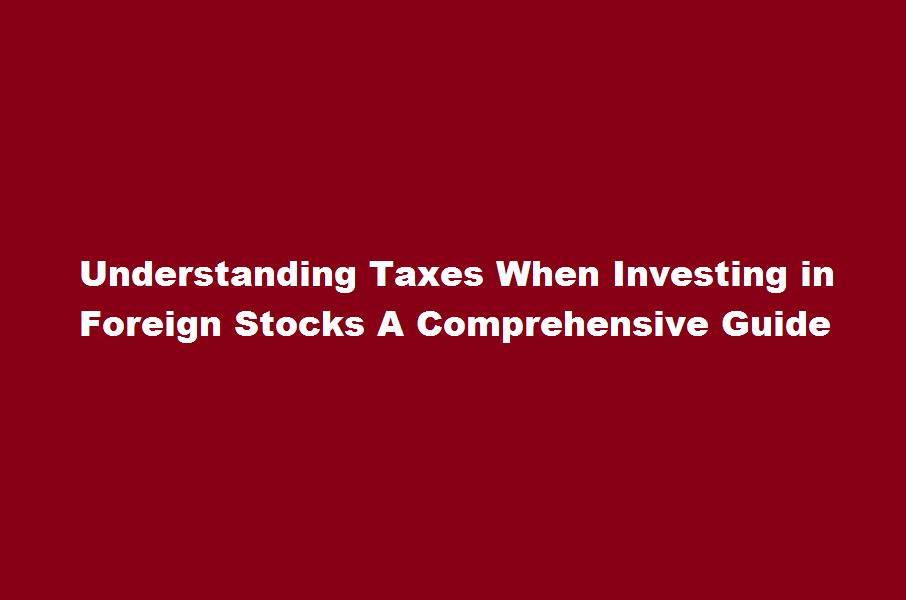Understanding Taxes When Investing in Foreign Stocks A Comprehensive Guide
4 min read
Introduction
Investing in foreign stocks offers opportunities for diversification and potential growth. However, it’s important to understand the tax implications associated with investing in international markets. Tax rules and regulations can vary across countries, impacting how taxes are levied on foreign stock investments. This article provides a comprehensive guide on how taxes work when investing in foreign stocks, covering topics such as tax implications, withholding taxes, foreign tax credits, tax treaties, and reporting requirements.
Tax Implications
- Capital Gains Tax When you sell foreign stocks at a profit, you may be subject to capital gains tax. The tax rate can vary depending on your country of residence and the holding period of the investment.
- Dividend Tax Dividends received from foreign stocks may be subject to taxation. Some countries have preferential tax rates for dividends received from certain countries, while others may impose higher tax rates or withhold taxes at the source.
- Tax Deductions In some cases, you may be eligible for tax deductions on expenses related to foreign stock investments, such as brokerage fees, research costs, and currency conversion fees. Consult with a tax professional to understand the specific deductions available in your jurisdiction.
Withholding Taxes
- Withholding Tax Rates Many countries impose withholding taxes on dividends paid to foreign investors. The tax rate can vary depending on the country and any applicable tax treaties. Withholding taxes are often deducted at the source before the dividends are paid to investors.
- Foreign Tax Credits Some countries allow investors to claim foreign tax credits to offset the taxes paid on foreign dividends. This can help avoid double taxation and reduce the overall tax burden.
Tax Treaties
- Double Taxation Treaties Many countries have entered into double taxation treaties to prevent investors from being taxed twice on the same income. These treaties often provide provisions for reduced withholding tax rates and mechanisms for claiming foreign tax credits.
- Country-Specific Treaties It’s important to be aware of the specific tax treaties between your country of residence and the countries where you plan to invest. These treaties can have significant implications for tax rates, exemptions, and reporting requirements.
Reporting Requirements
- Foreign Asset Reporting Some countries require residents to report their foreign stock holdings and income earned from foreign investments. Failure to comply with reporting requirements can result in penalties and legal consequences. Familiarize yourself with the reporting obligations in your jurisdiction.
- Tax Forms and Documentation Keep accurate records of your foreign stock transactions, including purchase and sale dates, cost basis, and any relevant documentation. These records will be necessary for tax reporting purposes.
Frequently Asked Questions
Do I have to pay taxes on foreign stocks in my home country and the foreign country?
Whether you are subject to double taxation depends on the tax laws of your home country and any applicable tax treaties. Consult with a tax professional to understand the specific rules and provisions that apply to your situation.
How can I reduce the impact of withholding taxes on foreign dividends?
You can explore the possibility of claiming foreign tax credits to offset the taxes paid on foreign dividends. Additionally, consider investing in countries with lower withholding tax rates or tax treaty provisions that provide exemptions or reduced rates.
What documents do I need for tax reporting on foreign stock investments?
Keep records of your foreign stock transactions, including purchase and sale dates, cost basis, and any relevant documentation such as trade confirmations and dividend statements. Consult with a tax professional to determine the specific documents required for tax reporting.
Are there any tax-efficient investment structures for investing in foreign stocks?
Some investment structures, such as certain types of retirement accounts or investment funds, may offer tax advantages for investing in foreign stocks. Consult with a financial advisor to explore tax-efficient investment options available in your country.
Can I claim a tax deduction for currency conversion fees when investing in foreign stocks?
In some cases, currency conversion fees incurred for foreign stock transactions may be eligible for tax deductions. Consult with a tax professional to determine the specific deductions available in your jurisdiction.
Conclusion
Understanding the tax implications of investing in foreign stocks is crucial for maximizing returns and complying with tax obligations. Consider the tax implications of capital gains, dividends, withholding taxes, foreign tax credits, tax treaties, and reporting requirements. Consult with tax professionals or advisors familiar with international taxation to ensure compliance with tax laws and optimize your investment strategy. By having a solid understanding of how taxes work when investing in foreign stocks, you can make informed decisions and manage your tax obligations effectively.
Read Also : Staying Updated on News and Events Impacting Foreign Stocks A Comprehensive Guide






